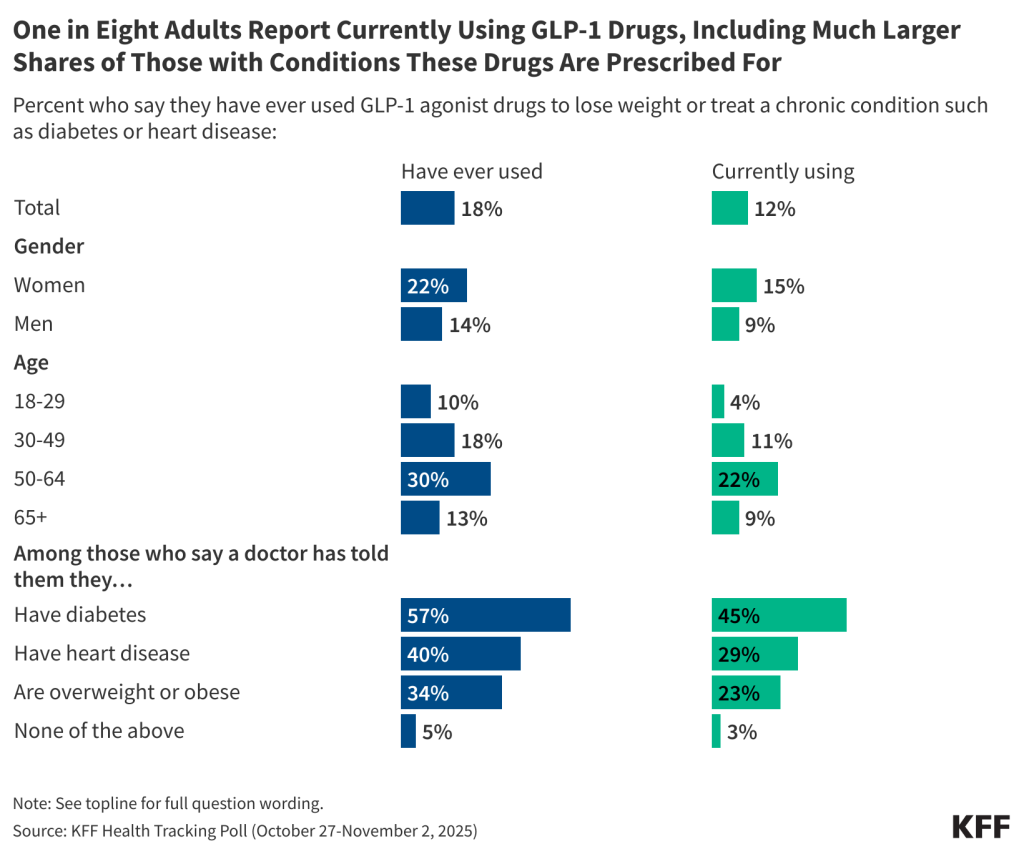Poll: 1 in 8 Adults Say They Are Currently Taking a GLP-1 Drug for Weight Loss, Diabetes or Another Condition, Even as Half Say the Drugs Are Difficult to Afford
Most Doubt the Trump Administration Will Lower Drug Costs for People Like Them, Though Three-Fourths of Republicans Expect It Will
About one in eight adults (12%) say that they are currently taking a GLP-1 drug such as Ozempic or Wegovy either to lose weight or treat a chronic condition, an increase from 18 months ago, though the high costs of the medications remain a concern, a new KFF Health Tracking Poll finds.
Overall nearly one in five adults (18%) say at some point they have taken a GLP-1 drug, a class of medications used for weight loss and to treat diabetes, heart disease, and other chronic conditions.
Women are more likely than men to say they are currently taking GLP-1 drugs (15% vs. 9%). Across age groups, current GLP-1 use is highest among adults ages 50-64 (22%). Lower use among those ages 65 and older (9%) likely reflects Medicare’s lack of coverage for drugs prescribed specifically for weight loss.
GLP-1 drugs have been used by large shares of adults who say they have been diagnosed with diabetes (57% have ever used the drug, including 45% who are currently using), heart disease (40% ever, 29% currently), or as obese or overweight in the past five years (34% ever, 23% currently).

While most adults who have taken GLP-1 drugs say their insurance covered at least a part of the cost of these drugs, about a quarter (27%) of users with health insurance say they paid the full cost of the drugs themselves.
The poll – fielded prior to President Trump’s announcement last week related to the cost and coverage of GLP-1 drugs – finds that about half of GLP-1 users (56%), including a similar share among those with insurance (55%), say that it was difficult to afford these drugs.
In addition, among adults who have ever taken GLP-1 drugs, cost is one of the most commonly cited reasons for stopping. Overall, 14% of GLP-1 users say they are now no longer using the medications due to the cost of the drugs. A similar share cite the drugs’ side effects (13%), while fewer say they stopped because their condition improved (5%).
Most Do Not Expect Trump Administration to Lower Drug Prices for People Like Them
Most of the public has heard little or nothing about recent Trump administration announcement aimed at addressing drug prices, including deals to lower what drug makers charge state Medicaid programs, a deal to lower the cost of in vitro fertilization (IVF) drugs, and plans for a website called TrumpRx that would allow people to buy drugs directly from manufacturers without using their health insurance.
When asked about whether they expected the Trump administration’s policies to lower the cost of prescription drugs for people like them, most (62%) say it is either “not too likely” or “not at all likely,” while nearly four in 10 (38%) say it is “very” or “somewhat likely.”
Those expectations are largely driven by partisanship. Large majorities of Republicans (73%) and MAGA supporters (83%) say it is likely that the Trump administration will lower drug prices for people like them, while far fewer independents (33%) and just one in 10 Democrats (9%) say that it is likely.
Medicare enrollees are more likely to think the Trump administration policies will help people like them. About half (49%) of adults ages 65 and older with Medicare say they think it is likely that the Trump administration will lower their prescription drug costs, compared to smaller shares of adults under age 65 with employer-sponsored insurance (34%) or Medicaid (32%).
Other findings include:
- Overall, about one in four (26%) adults say they or someone in their household had problems paying for prescription drugs in the past year. The shares are higher among uninsured adults (41%), Hispanic adults (33%), Black adults (32%), and those with annual household incomes below $40,000 (33%).
- Most people who have taken GLP-1 drugs say they got them from one of their doctors (76%), while about one in six (17%) say they got them from an online provider or website, and one in ten (9%) report getting them from a medical spa or aesthetic medical center.
- Among people who have not taken a GLP-1 drug, about one in five (22%) say they would be interested in taking a GLP-1 drug to lose weight, including 7% who say they would be “very interested.” Women are more likely than men to say they would be at least somewhat interested in taking these drugs to lose weight (27% v. 18%). Interest rises to four in ten (43%) among adults who have been diagnosed as obese or overweight but are not currently taking these drugs.
Designed and analyzed by public opinion researchers at KFF, this survey was conducted October 27-November 2, 2025, online and by telephone among a nationally representative sample of 1,350 U.S. adults in English and in Spanish. The margin of sampling error is plus or minus 3 percentage points for the full sample. For results based on other subgroups, the margin of sampling error may be higher.